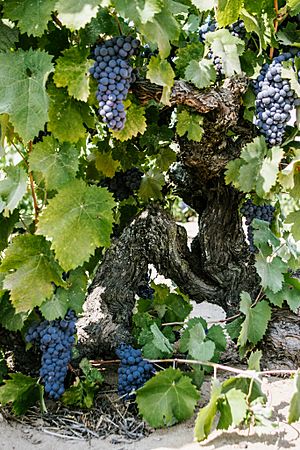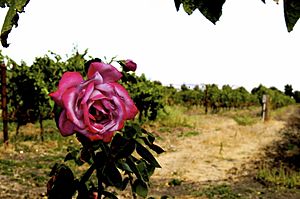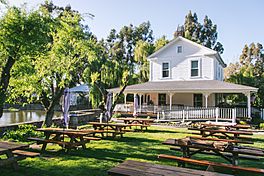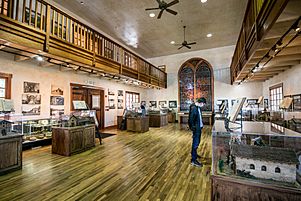Cline Cellars facts for kids
Quick facts for kids Cline Cellars Winery |
|
|---|---|
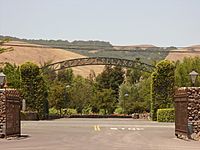 |
|
| Location | Sonoma, California, USA |
| Appellation | Carneros AVA |
| Other labels | Farmhouse, Cashmere |
| Founded | 1982 |
| First vintage | 1982 |
| Key people | Nancy and Fred Cline, Proprietors; John Grant, CEO; Hilary Cline, Vice President of Marketing and DtC; Tom Gendall, Director of Winemaking and Viticulture; |
| Varietals | Zinfandel, Mourvèdre, Carignane, Pinot noir, Syrah, Viognier, Marsanne, Rousanne |
| Distribution | International |
| Tasting | Open to the public |
Cline Cellars Winery is a family-run business in Sonoma County, California. It is located in the Carneros wine region. This winery is known for making different kinds of wines. These include Zinfandels, Rhône-style wines, Chardonnay, and Pinot Noir.
Contents
History of Cline Cellars
How the Winery Started
In 1982, Fred Cline started Cline Cellars winery. He used money he received from his grandfather, Valeriano Jacuzzi. Valeriano Jacuzzi was one of the brothers who invented the Jacuzzi whirlpool bath. The first winery was in Contra Costa County, in a town called Oakley, California. Fred Cline was one of the first people to plant French Rhône grape types in California. He is also one of the original Rhone Rangers, a group that promotes these wines.
Moving to Sonoma Valley
In 1991, Fred Cline and his wife, Nancy Cline, moved the winery. They moved it from Oakley to a large property in the Carneros region of Sonoma Valley. This property is 350 acres big. It was once a village for the Miwok people. It was also the first site of Mission San Francisco de Solano.
In the 1850s, a German family, Julius and Katherine Adolph Poppe, owned the land. They ran a dairy farm. They also supplied most of San Francisco with carp fish. They kept the fish in six ponds fed by natural springs. These ponds are still on the property today. Later, in the 1970s, Haddon Salt bought the property to raise horses. The Clines bought the property from Salt in 1989.
In 2007, Fred and Nancy Cline opened another winery. It is called Jacuzzi Family Vineyards. It is right across the street from Cline Cellars. They built it to honor Fred's grandparents.
Vineyards and Farming Practices
Ancient Vines and Winemaking
Cline Cellars is famous for its "ancient vines" wines. These grapes come from Contra Costa County. The main winemaker is Tom Gendall. He joined the team in 2017. The historic vineyards in Oakley have very old grapevines. Some are 80 to 120 years old. These include Mourvèdre, Carignane, Grenache, Palomino, and Zinfandel. About 42 acres of Carignane and Zinfandel vines were planted in 1906 and 1925. Also, 14 acres of Mourvèdre vines date back to 1920.
The sandy soil in Contra Costa County helps protect the vines. It naturally resists a tiny bug called phylloxera. This bug eats grapevines. Because of the soil, the old vines in these vineyards are still on their original roots. The bug never harmed them.
Sustainable Farming Methods
The winery cares a lot about being sustainable. Their farming methods show this dedication. Cline Cellars is certified as sustainable in both the vineyard and the winery. They are also Sonoma County Certified Sustainable. They became the second largest winery in California to be completely solar powered. They installed a huge area of solar panels, covering 34,625 square feet.
Fred Cline calls his farming methods "Green String certified." This means they use natural ways to care for the land. They use special plants between the rows of grapes to make the soil healthy. They also use sheep to eat weeds in the vineyards. Instead of chemical fertilizers, they use "compost teas." These are natural fertilizers made from compost.
Visiting Cline Cellars
The Tasting Room
The tasting room is in an old farmhouse from the 1850s. It looks very rustic. The farmhouse is surrounded by six ponds fed by springs. There are also thousands of rose bushes. The winery is open every day for visitors. You can take tours and taste wines. They also have a wine club for people who want to join.
California Missions Museum
Nancy Cline opened the California Missions Museum in 2005. She wanted to celebrate the property's history. The land has a connection to the Sonoma Mission. The museum was built to hold a full set of California Mission models. These models were made by German woodworkers for a big event in 1939. In 1998, the Cline family saved these models from being sold separately. They built the museum to display them.
The museum also has a life-sized figure of Father Junipero Serra. He was an important figure in the California missions. You can also see mission paintings by Robert Morris and Henry Nelson. There are two beautiful stained-glass panels too. These panels were originally in San Francisco's Mission Dolores. They were moved before the big 1906 San Francisco earthquake. The museum is open daily, and it's free to visit.
See also
- Sonoma County wine
 | Bessie Coleman |
 | Spann Watson |
 | Jill E. Brown |
 | Sherman W. White |


